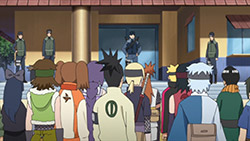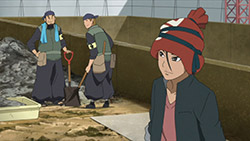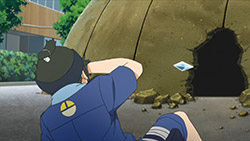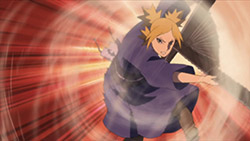 |
 |
 |
 |
 |
 |
 |
 |
 |
 |
 |
 |
 |
 |
 |
 |
 |
 |
 |
 |
 |
 |
 |
 |
 |
 |
 |
 |
 |
 |
 |
 |
 |
 |
 |
 |
“Shikadai’s Doubts”
Troubles with Robin Hood
The Byakuya Gang continue running amok, to the extent that genin are put on recon duty, while every shinobi above the level of chunin has been mobilised. However, there has been a significant shift in the dynamic to which the Byakuya Gang’s crimes are perceived. Disillusionment is hardly limited to impoverished villages on the fringe. Sympathy cones from even those residing within Konoha, indicating widespread popular discontent. When Shikadai openly throws shade at Denki for being wealthy, who doesn’t have a single friend stick up for him, one can gather that rich people aren’t held in high regards by the populace.
Contrary to the aforementioned responses, Boruto strongly expresses a different viewpoint that he stubbornly adheres by. Rather than condoning any stealing, or exhibiting anger towards the rich, he takes to blaming the Hokage for not doing nearly enough to bridge the wealth inequality. Is it fair to point the finger like that? Yes, Naruto could be doing a better job. But without an efficient governmental infrastructure in place to help him handle various aspects of rapid economic expansion, he’s been left to do a monumental task on his lonesome. Is it entirely his fault? Not necessarily. No Hokage before him had to deal with these kind of problems, and as a result, the concept of a systematic government is an idea which hasn’t been devised in terms of dealing with these issues. If I had to guess, the shinobi’s conception of pride is a massive stumbling block when it comes to delegating various tasks among a select body of capable individuals. This preconceived cultural responsibility of a Hokage taking upon everything is deeply ingrained into Naruto’s mindset, as well as every other citizen, meaning that it will be a long time before people start considering alternatives. Until some sort of ninja constitution is drafted up, a separation of powers is unlikely to take place.
Shikadai and Ryogi
My enjoyment for the interactions between Shikadai and Ryogi far exceed the intense bond forged between Boruto and Kagura. So far, it’s been much more intellectual in its inclination, where they pick up on subtle cues from each other. There’s no way that Shikadai wouldn’t know that Ryogi is a part of the Byakuya Gang. Incidentally, I think there’s no way that Ryogi would start dropping significant hints without an ulterior motive, specifically to sway Shikadai into joining his cause. To some extent, I would say it has been somewhat effective. Why else would Shikadai hold back against giving pursuit, even if it meant defying his mother’s orders?
But despite his doubts, I don’t think Shikadai will betray the village without properly assessing the Byakuya Gang’s true cause. It has been hinted that the leader of the mercenaries has ulterior motives beyond simply helping the poverty-stricken villagers, and I also reckon that he’s exploiting Ryogi for his ice release. Much like what Boruto did for Kagura, this unexpected friendship should probably serve as a pivotal point, that could shake up Ryogi’s brainwashed outlook.
Concluding Thoughts
Last week, some readers raised the point that Naruto doesn’t have the power to bring economic relief to impoverished villages. I was quite busy, and didn’t get the time to properly address those comments, so I will take the opportunity to draft an appropriate response that lays out my reasoning behind such claims. In a post-war age, fraught with rapid economic expansions, the role of a Hokage has greatly changed. Even in the original series, the Daimyos are something of a figurehead of power who don’t actually hold much of it. That much was made clear in Shippuden’s Five Kage conference, where the kages were noticeably calling the shots, with minimal interference from the daimyos.
But let’s draw some parallels from Japanese history, the source that Boruto presumably derives its inspiration. Emperor Akihito was a puppet of the military during the Second World War, and the monarchy’s influence has greatly diminished since then. After which, the government took charge and oversaw the increasing rate of modernisation, an occurrence which has also happened in Konoha. Naruto has taken on a role akin to being a Prime Minister, and his task has evolved beyond simply being a military leader like his predecessors. As such, it would seem that additional responsibilities have fallen upon his shoulders, that extends to managing the Land of Fire as a whole. To me, this is evident where Boruto criticises his father in this episode for being an inefficient leader for failing to adequately ensure an even distribution of wealth – suggesting that these impoverished villages should fall under Naruto’s administrative ambit.
Rather than being a short-term problem concerning rogue thieves, this is symptomatic of a much more serious issue that could bear heavier implications in the future. I doubt that a socio-economic trouble on this scale can be resolved in a short span of time. So it will be interesting to see a continuation of this underlying theme, even after the Byakuya Gang are dealt with, and how it might play into the development of Boruto’s overarching story.
Preview
 |
 |
 |

For all of the faults of the anime, like the usual lackluster resolutions to the plots of the villains, they are doing a good job building up the faults of the Naruto administration and why he will eventually fall as seen in the very beginning.
Mm, not sure I’m convinced. What Boruto ignores about his father’s job is far more than what he knows, and that’s been a point of the series so far.
I take the real political dealings in the Land of Waves arc (where the daimyos were about to cause a war despite the accord of the ninja villages) above Boruto’s words to measure what kind of power a Kage really has in the country they’re in. Especially since we all know Boruto carries a grudge against his father and his approach to the issue at hand is extremely simplistic, unlike Shikadai’s. Ninja may be the de facto military, and that carries a lot of influence, but I doubt Kages have any say in the country’s domestic economy, for example. Still, I acknowledge that we don’t have much information about that yet (crossing fingers!).
But what about the growing inequality in Konoha? That definitely falls under Naruto’s power. Which leads us to…
Agreed, and that’s a problem that Naruto is actually making worse. I mentioned it in a previous chapter: Naruto’s impressive clone army is a drawback in the long run, for both his family life and Konoha’s development. Any other ninja would have realized that the current workload is impossible for a single person to manage. But since Naruto can always count on his shadow clones to be in different places at the same time, he hasn’t learned to delegate.
I hope that we’ll see learn that lesson sooner or later. Perhaps he might be incapacitated for a relatively long time in the future and his successor has to change how things work at the office.
Also his Clones see all problems in point of View of his Host/Master. Seems like Naruto do not want help in this Important position. Lucky he put the Spy network things into Sasuke’s hands
https://randomc.net/image/Boruto%20Naruto%20Next%20Generations/Boruto%20Naruto%20Next%20Generations%20-%2044%20-%20Large%2015.jpg
Future plot.
https://randomc.net/image/Boruto%20Naruto%20Next%20Generations/Boruto%20Naruto%20Next%20Generations%20-%2044%20-%20Large%2012.jpg
https://randomc.net/image/Boruto%20Naruto%20Next%20Generations/Boruto%20Naruto%20Next%20Generations%20-%2044%20-%20Large%20Preview%2002.jpg
Zaiden, you….
It took me two times until I understood the opening line. Nicely played.
I think you meant Emperor Hirohito. Akhito, his son, did not take the throne until 1989.